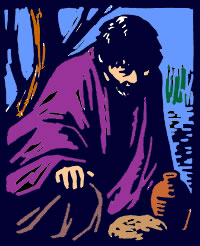
19th Sunday in Ordinary Time Year B
We continue the Eucharistic meditation from John’s gospel. Last week Jesus called his audience to be open to the gift of faith that will enable them to appreciate the Eucharistic mystery. In today’s reading he explains further what this faith implies. Understanding that this passage is a meditative recollection of what Jesus had done for us, we are able to share in the outlook of the community in which this gospel was written. This passage echoes many of the themes that were fundamental to the faith of that community. John’s gospel begins with a declaration of faith in the Incarnation: ‘The Word became flesh’. This momentous truth is constantly reaffirmed in the writings of this community. Jesus is confronted, in our passage, by the complaints of those who find it hard to accept: ‘Come down from heaven! This is Jesus the son of Joseph’. The faith to which Jesus calls us, however, is not an embarrassing burden. It is a blessing that comes to us from the depths of the divine generosity and freedom - we are ‘drawn by the Father’, setting out on a journey which leads to ‘eternal life’ in God.
The Father and the Son share in all things, and so he declares that faith is also his gift, a gift that will be ours when we ‘come to him’ – we must live in his company as his first disciples did. For Christian faith, Jesus is the revelation of the Father - he has truly ‘come from God’, and ‘has seen the Father’ – an echo of the memorable words of the gospel’s opening: ‘it is the only son who is close to the Father’s heart who had made him known’. The teaching is like a commentary on his words at the Supper: ‘Eternal life is this: to know you [Father], the only true God, and Jesus Christ whom you have sent’. Those who live by the faith Jesus is offering share in the divine wisdom itself; they ‘hear the teaching of the Father and learn from it’. (‘Knowledge’ in the Scriptures, and in the outlook of the community of John’s gospel, has a rich and profound meaning; it is personal and life-giving, far more than the gaining of information.) Referring to the manna – symbol of God’s caring for the people of the Exodus - Jesus reminds his listeners that the time of foreshadowing has ended. (Our first reading mirrors this theme – in the strength of heavenly food, the prophet walks for forty days until he reaches ‘Horeb, the mountain of God’ - another name for Sinai where the old covenant was given.) The faith Jesus offers recognises that all the promises that sustained Israel’s faith are being fulfilled: ‘I AM the living bread come down from heaven’.
Jesus has prepared his listeners for his announcing of the Eucharistic mystery. Through this mystery he will be nourishing bread for the world, not in metaphor only, but in reality: ‘The bread that I shall give is my flesh for the life of the world’. These climactic words clearly echo the words of the Eucharistic ritual familiar to the community of John’s gospel: ‘This is my body, given for you’. ‘Jesus came in the flesh’ is one of the formulas of this community’s Incarnation faith.
Paul’s teaching from Ephesians continues to chime in with our theme: let your communion be shown by genuine friendship; show forth the Christ-life you share in through the Paschal Mystery.
John Thornhill sm

